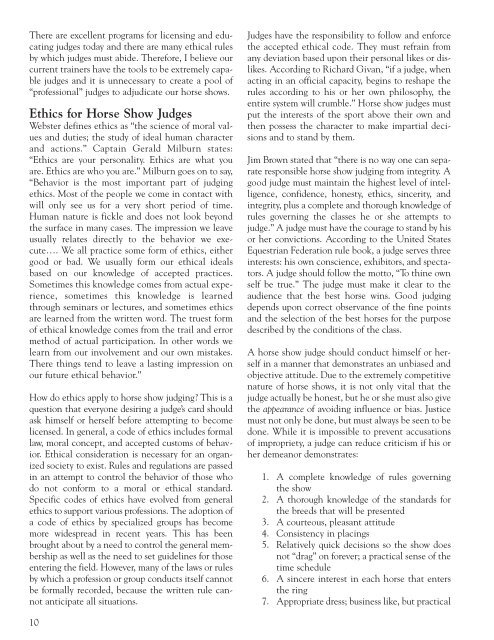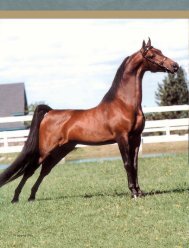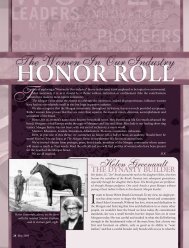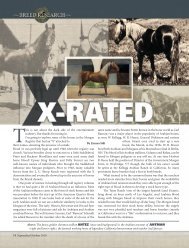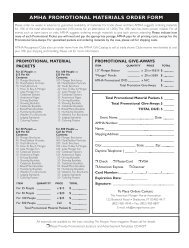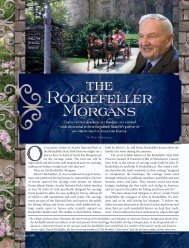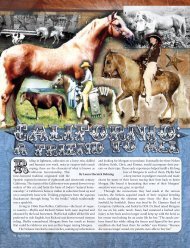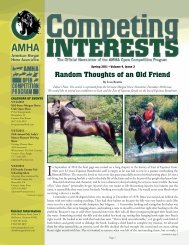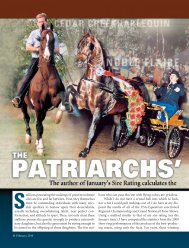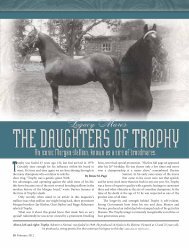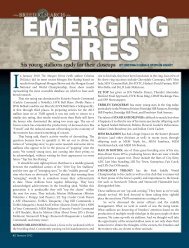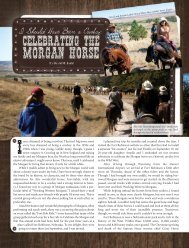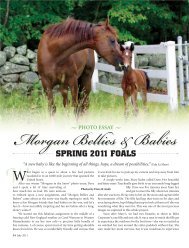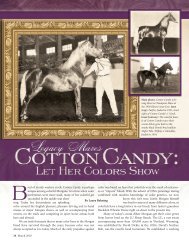Judging School Handbook - American Morgan Horse Association
Judging School Handbook - American Morgan Horse Association
Judging School Handbook - American Morgan Horse Association
You also want an ePaper? Increase the reach of your titles
YUMPU automatically turns print PDFs into web optimized ePapers that Google loves.
There are excellent programs for licensing and educatingjudges today and there are many ethical rulesby which judges must abide. Therefore, I believe ourcurrent trainers have the tools to be extremely capablejudges and it is unnecessary to create a pool of“professional” judges to adjudicate our horse shows.Ethics for <strong>Horse</strong> Show JudgesWebster defines ethics as “the science of moral valuesand duties; the study of ideal human characterand actions.” Captain Gerald Milburn states:“Ethics are your personality. Ethics are what youare. Ethics are who you are.” Milburn goes on to say,“Behavior is the most important part of judgingethics. Most of the people we come in contact withwill only see us for a very short period of time.Human nature is fickle and does not look beyondthe surface in many cases. The impression we leaveusually relates directly to the behavior we execute….We all practice some form of ethics, eithergood or bad. We usually form our ethical idealsbased on our knowledge of accepted practices.Sometimes this knowledge comes from actual experience,sometimes this knowledge is learnedthrough seminars or lectures, and sometimes ethicsare learned from the written word. The truest formof ethical knowledge comes from the trail and errormethod of actual participation. In other words welearn from our involvement and our own mistakes.There things tend to leave a lasting impression onour future ethical behavior.”How do ethics apply to horse show judging? This is aquestion that everyone desiring a judge’s card shouldask himself or herself before attempting to becomelicensed. In general, a code of ethics includes formallaw, moral concept, and accepted customs of behavior.Ethical consideration is necessary for an organizedsociety to exist. Rules and regulations are passedin an attempt to control the behavior of those whodo not conform to a moral or ethical standard.Specific codes of ethics have evolved from generalethics to support various professions. The adoption ofa code of ethics by specialized groups has becomemore widespread in recent years. This has beenbrought about by a need to control the general membershipas well as the need to set guidelines for thoseentering the field. However, many of the laws or rulesby which a profession or group conducts itself cannotbe formally recorded, because the written rule cannotanticipate all situations.Judges have the responsibility to follow and enforcethe accepted ethical code. They must refrain fromany deviation based upon their personal likes or dislikes.According to Richard Givan, “if a judge, whenacting in an official capacity, begins to reshape therules according to his or her own philosophy, theentire system will crumble.” <strong>Horse</strong> show judges mustput the interests of the sport above their own andthen possess the character to make impartial decisionsand to stand by them.Jim Brown stated that “there is no way one can separateresponsible horse show judging from integrity. Agood judge must maintain the highest level of intelligence,confidence, honesty, ethics, sincerity, andintegrity, plus a complete and thorough knowledge ofrules governing the classes he or she attempts tojudge.” A judge must have the courage to stand by hisor her convictions. According to the United StatesEquestrian Federation rule book, a judge serves threeinterests: his own conscience, exhibitors, and spectators.A judge should follow the motto, “To thine ownself be true.” The judge must make it clear to theaudience that the best horse wins. Good judgingdepends upon correct observance of the fine pointsand the selection of the best horses for the purposedescribed by the conditions of the class.A horse show judge should conduct himself or herselfin a manner that demonstrates an unbiased andobjective attitude. Due to the extremely competitivenature of horse shows, it is not only vital that thejudge actually be honest, but he or she must also givethe appearance of avoiding influence or bias. Justicemust not only be done, but must always be seen to bedone. While it is impossible to prevent accusationsof impropriety, a judge can reduce criticism if his orher demeanor demonstrates:1. A complete knowledge of rules governingthe show2. A thorough knowledge of the standards forthe breeds that will be presented3. A courteous, pleasant attitude4. Consistency in placings5. Relatively quick decisions so the show doesnot “drag” on forever; a practical sense of thetime schedule6. A sincere interest in each horse that entersthe ring7. Appropriate dress; business like, but practical10


